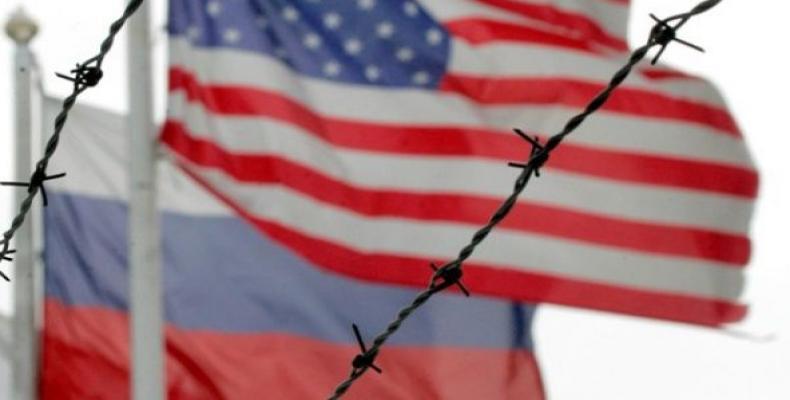Moscow, July 28 (RHC)-- The Russian government has told the United States it must reduce the number of its diplomats and technical staff in Russia to 455. That is the same as the number of Russian personnel in the United States, after former President Barack Obama expelled 35 diplomats in 2016 shortly before he left office. Moscow is also halting the U.S. embassy's use of a storage facility and a holiday cottage.
A statement from the Russian foreign ministry made it clear that: “In the case of new unilateral actions of the U.S. authorities to reduce the number of our diplomats in the U.S., it will be followed by a tit-for-tat response.”
Moscow's move comes in response to a bipartisan resolution passed on Thursday by the U.S. Senate in support of the "Countering America’s Adversaries Through Sanctions Act." The bill, which includes a provision that allows Congress to stop any effort by U.S. President Donald Trump to ease existing sanctions on Russia, will now be sent to the White House for Trump to sign into law or veto.
The package has been described as the most severe since the end of the Cold War, with Russia being labelled a “hostile regime” along with Washington's traditional group of so-called “rogue states,” including Iran and the Democratic People's Republic of Korea.
Russian President Vladimir Putin, speaking at a joint news conference with his Finnish counterpart Sauli Niinisto, derided the move as the latest act of “insolence” directed toward Moscow by Washington stemming from an unfounded “hysteria” reflecting allegations of Russian meddling in U.S. elections.
“This practice is unacceptable – it is destroying international relations and international law,” Putin said in reference to the “transnational character of U.S. legislation.”
“I would call them particularly cynical because they amount to an obvious attempt to use one’s geopolitical advantages in the competitive struggle in order to protect one’s economic interests at the expense of one’s allies, as in this case,” he continued.
“The sanctions are absolutely illegal from the perspective of international law and they violate the principles of international trade and World Trade Organization rules,” the Russian president noted.
According to experts, the U.S. sanctions will impact a broad range of Russian industries and especially its energy sector, including the high-profile Nord Stream 2 and Turkish Stream pipelines.
Russian and European analysts say the sanctions reflect an ulterior motive whereby the European Union, denied access to Russian liquefied gas, will be forced to purchase energy products from the United States instead.
"All we are seeing now is an element of an economic war that has continued between the U.S. and the European Union for several years already," Vyacheslav Kulagin from the Energy Research Institute of the Russian Academy of Sciences told the Russian news agency TASS.
Moscow had been circumspect in its responses to Washington's imposition of back-to-back sanctions, exercising restraint itself in the hope that the election of Trump would signal a breakthrough in relations between the Kremlin and the White House.
"Until this time, the Russian leadership tried not to respond to the challenges thrown down first by the Obama administration and then retained by the Trump administration," Russian political analyst Andrey Sidorov told TASS. "Trump has failed to repair the ties. The sanctions bill will, most probably, be approved, which will inevitably bring us to the Cold War."
The order to cut the number of U.S. diplomats has been described as a modest, first step. Other measures reportedly under consideration by the Russian government include an end to diplomatic cooperation on sensitive issues like the DPRK's weapon tests, halting Russian-U.S. collaboration in operating the International Space Station, increased restrictions on U.S. companies working in Russia, and halting enriched uranium shipments to U.S. power plants.
Russia Cuts U.S. Diplomats in Moscow In Response to Washington's Sanctions

Matérias relacionadas
Comentários
Deixe um comentário
Todos os campos são requeridosMais vistas
- Nicolás Maduro recorda golpe militar contra Hugo Chávez em 2002
- Sensacional sucesso cubano no Mundial Pro Tour de Vôlei de Praia
- 11ª Convenção Internacional de Ciências da Terra conclui em Cuba
- Trabalhadores cubanos se preparam para o Primeiro de Maio
- Ouro e prata para Cuba no Aberto de Natação da República Dominicana

